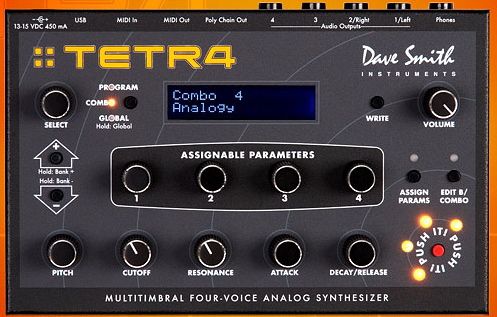
Dave Smith Instruments has introduced a new multitimbral synthesizer, the DSI Tetra.
Tetra’s four voices feature a 100% analog signal path and four-part multitimbral operation with individual outputs per voice.
Tetra takes the sound and features of the DSI Mopho, multiplies them by four, and packs them in a box less than half an inch larger.
“We’ve been getting the message loud and clear from our customers that ‘smaller is better,’” said company founder Dave Smith. “All our recent products pack a lot of power and functionality into a small package—even the Prophet ’08, which is relatively small for a full-sized keyboard. We’d also gotten a lot of requests for a poly version of Mopho, our analog mono synth, which has been very successful. By following Mopho’s lead and paring the interface down to the essentials, we can keep the price low and provide excellent value. Everybody wins.”
The DSI Tetra retails for $799.
If you’ve used the Dave Smith Instruments Tetra, leave a comment with your thoughts!
Dave Smith Tetra Synthesizer Details
Tetra is fully programmable via the front panel or with a free downloadable editor for Mac OS and Windows.
Tetra is basically four Mophos in a very compact (7.9″ L x 5″ W) enclosure, a sort of mini Prophet with a couple of extra tricks up its sleeve: specifically, a sub-octave generator for each oscillator and feedback. With a street price of approximately $799, that’s like four Mophos for the price of two. And it’s expandable. Tetra can be poly chained with additional Tetras or a Prophet ’08 for up to sixteen-voice polyphony.
Other features include Combo Mode, used to combine four programs into unison or poly “super patches.” Combos can also play four 16 x 4 step sequences—one per voice/program—
simultaneously. In Multi Mode, each of Tetra’s voices responds to a different MIDI channel, making it ideal for complex arrangements and sequencing analog drum sounds. Tetra is the first DSI product to feature USB.
USB is one of the most requested features across our entire product line,” said DSI’s Tracy Wadley, “so it’s great to be able to offer it.”
Features:
- Affordable, fully programmable poly synth with a 100% analog signal path.
- Classic, real analog sound—including legendary Curtis analog low-pass filter.
- Four-part multitimbral capability with four separate outputs.
- Combo Mode for huge unison patches, stacked sequences, and “modular-style” poly sounds.
- Expandable: poly chain with other Tetras, Prophet ’08, and Mopho for expanded polyphony
- Just 7.9″ x 5″ (20.07 cm x 12.7 cm).
- Free editor for Mac OS and Windows.
Specifications:
- Multitimbral four-voice analog synthesizer
- 100% analog signal path
- Two oscillators per voice (sawtooth, triangle, saw/triangle, square with variable pulse width) with hard sync
- White noise generator
- One classic Curtis low-pass filter (switchable 2- or 4-pole) per voice, self-oscillating in 4-pole mode
- Analog VCAs
- Three envelope generators (ADSR plus delay) per voice
- Four LFOs per voice
- Two sub-octave generators (one octave down and two octaves down) per voice
- Feedback loop per voice with programmable level and gain
- Four assignable performance controls per program
- Gated 16 x 4 step sequencer (one sequence per program)
- Arpeggiator
- Fully programmable (free downloadable software editor for Mac OS and Windows)
- 512 programs organized into four banks of 128; 128 combos
- I/O: USB 2.0 (type B receptacle), MIDI In, MIDI Out/Thru, Poly Chain Out, Audio Outs 1/Left, 2/Right, 3, and 4 (1/4″ unbalanced), 1/4″ Headphone Out
- 7.9” L x 5” W x 2.7” H (20.07 cm x 12.7 cm x 6.86 cm)
- 1.8 lb. (0.81 kg)

Dave Smith et al really have to stop making more of these cute wee synths. It's not fair: it's like putting sweeties for sale at the checkout.
But seriously, is someone going to market a groovy little glow-in-the-dark tiered shelf unit to make a space-efficient home for my growing collection of approximately 7 x 12 x 2" sweeties? ;-p
Great idea.
I'm still hoping for keyboard versions of these bad boys!
Adding a keyboard would pretty much defeat the purpose of these synths by raising the price significantly. The keyboard version of the Prophet is about $500 more than the rack version – that would more than double the price of the Mopho. I'd love that VST editor they promised long ago, though.
Back to the Tetra – it looks like another great deal and the USB/pots are smart ideas, but I'll save my money and just multi-track my Mopho.
No Audio Input???WTF…
I love mine. Caveats are clicky envelopes when used for sounds needing quick attacks and a strange relationship with Soundtower software. But it has beautiful analog depths yet unplumbed and most recent OS releases add a ton of functionality to its’ interface.